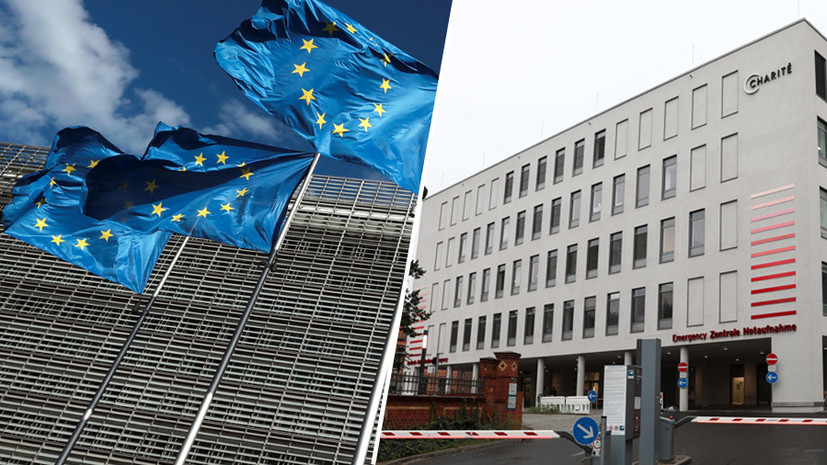The Permanent Mission of Russia to the European Union has appealed to EU officials and MEPs with an appeal to answer questions from the Russian side related to accusations against Moscow after the incident with Alexei Navalny.
This is stated in a comment posted on the website of the Russian diplomatic mission.
“In recent weeks, we have seen a rapidly intensifying information campaign in the EU - both in official circles and in the media - about the incident with the Russian political activist and blogger Alexei Navalny on August 20, 2020,” the diplomats stated.
“We do not consider ourselves to be experts in toxicology, but we still consider it necessary to draw your attention to a number of inconsistencies regarding this case.
In the light of the upcoming discussion in the European Parliament, we call on EU officials and EP deputies to study a number of the following issues, ”the Permanent Mission said.
According to TASS, the corresponding document has already been sent to the European Parliament.
In total, European politicians were asked nine questions.
The first of them: is there any sense for the Russian authorities in "poisoning" Navalny with a military nerve agent in a city with half a million population, and then do everything possible to save his life and release him for treatment in Germany, where Can the "newbie" be identified?
Further, the question is raised about the expediency of "poisoning" Navalny, the level of trust of Russians in which, according to the July survey of the non-state "Levada Center", is about 2%.
Russian diplomats also asked why the German authorities did not respond to a request to transfer to Moscow or publish the results of toxicological analyzes carried out in a specialized laboratory of the German Armed Forces, on the basis of which Navalny was alleged to have been “poisoned”.
Instead of cooperation in Berlin, at first the process was delayed, and then it was announced at all that no evidence would be presented.
The permanent mission drew attention to the fact that Moscow is constantly urged to conduct a thorough and transparent investigation of the alleged assassination attempt, and at the same time, some of the people who accompanied Navalny during his trip to Siberia left the Russian Federation after the incident and went to Germany.
“Why is it claimed that the Novichok group's military nerve agent was developed by the Soviet Union and then Russia, while ignoring the fact that specialists from Western countries and relevant NATO centers have been developing chemicals associated with the group for a number of years "Newbie"?
For example, the United States has issued more than 150 patents for the combat use of these chemicals, ”one of the questions says.
The Russian side is also interested in why Navalny's transportation to the Berlin clinic "Charite" was accompanied by heightened security measures, although at that time there were no reports about the "discovery" of "Novichok".
“Does this mean that Berlin knew something in advance that they did not know either in Moscow or in Omsk?
It is worth noting that more than 60 biochemical analyzes were carried out in the Omsk hospital, none of which showed any signs of poisoning, ”the permanent mission added.
Another question concerns a bottle of water, on which, according to the German side, traces of a poisonous substance were allegedly found, while there is not a single photo or video evidence that Navalny drank from a similar bottle before flying from Tomsk airport.
In addition, it is not clear how the said bottle got to Berlin.
"Why do German doctors from the Charite hospital shy away from a professional dialogue with their Russian colleagues, despite the obvious discrepancies between symptoms, toxicological analyzes and Mr. Navalny's diagnosis?"
- said the diplomats, pointing out that Berlin had rejected the proposal to create a joint independent group to study the case.
In conclusion, the permanent mission asked why not a single German specialist in toxicology (military or civilian), nor the doctors of the Charite clinic made a competent conclusion about the incident, as did the doctors in Omsk.
It is also emphasized that any references to the need for the patient's consent to the disclosure of his medical data do not fit with the numerous political statements made in Germany while Navalny was in a coma.
It should be reminded that on August 20, an S7 airline plane performing a flight Tomsk - Moscow made an emergency landing at the Omsk airport.
On board was Alexei Navalny, who suddenly became ill during the flight.
He was urgently hospitalized at a local hospital, he was unconscious.
On August 22, Navalny was transported to the Berlin clinic "Charite" after doctors from the Omsk hospital considered the patient's condition stable.
Later, the German authorities, referring to research carried out by specialists from the laboratory of the German Armed Forces, stated that Navalny was allegedly poisoned with a nerve agent from the Novichok group.
However, the Russian doctors who treated the blogger repeatedly stated that the tests carried out did not reveal any traces of toxic substances in the patient's body.
The day before, Navalny published a post on social networks, telling about his condition after coming out of a coma and attaching the first photo since the incident.

